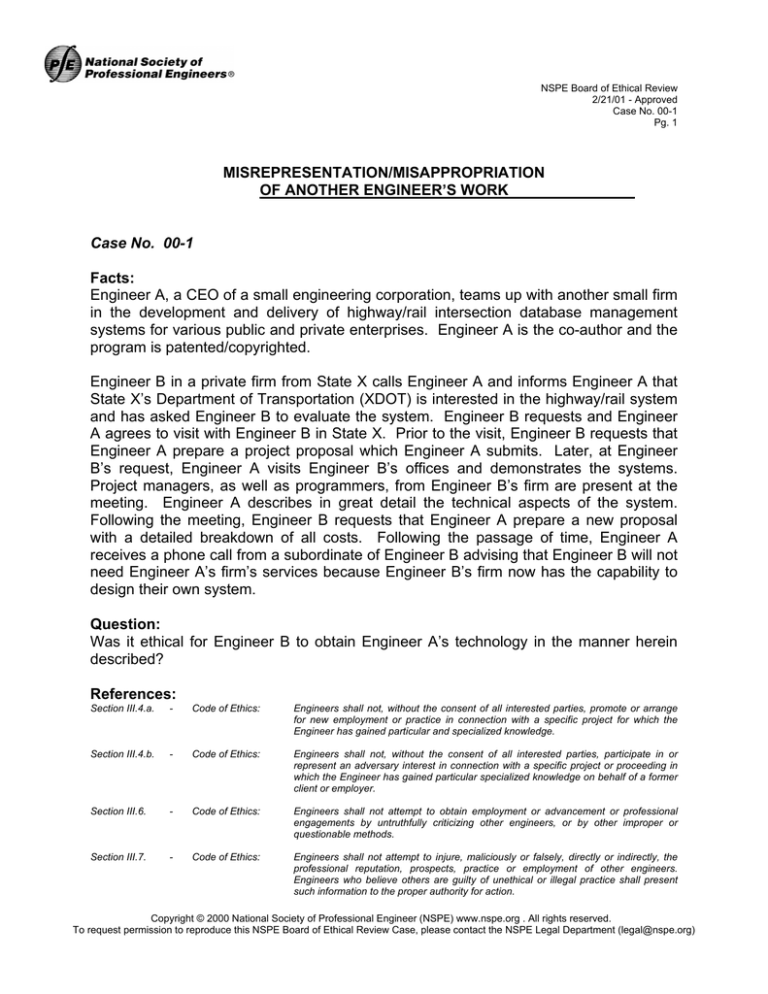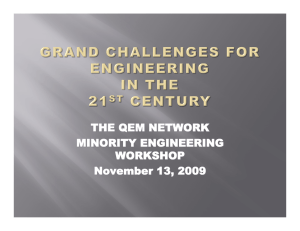
NSPE Board of Ethical Review
2/21/01 - Approved
Case No. 00-1
Pg. 1
MISREPRESENTATION/MISAPPROPRIATION
OF ANOTHER ENGINEER’S WORK
Case No. 00-1
Facts:
Engineer A, a CEO of a small engineering corporation, teams up with another small firm
in the development and delivery of highway/rail intersection database management
systems for various public and private enterprises. Engineer A is the co-author and the
program is patented/copyrighted.
Engineer B in a private firm from State X calls Engineer A and informs Engineer A that
State X’s Department of Transportation (XDOT) is interested in the highway/rail system
and has asked Engineer B to evaluate the system. Engineer B requests and Engineer
A agrees to visit with Engineer B in State X. Prior to the visit, Engineer B requests that
Engineer A prepare a project proposal which Engineer A submits. Later, at Engineer
B’s request, Engineer A visits Engineer B’s offices and demonstrates the systems.
Project managers, as well as programmers, from Engineer B’s firm are present at the
meeting. Engineer A describes in great detail the technical aspects of the system.
Following the meeting, Engineer B requests that Engineer A prepare a new proposal
with a detailed breakdown of all costs. Following the passage of time, Engineer A
receives a phone call from a subordinate of Engineer B advising that Engineer B will not
need Engineer A’s firm’s services because Engineer B’s firm now has the capability to
design their own system.
Question:
Was it ethical for Engineer B to obtain Engineer A’s technology in the manner herein
described?
References:
Section III.4.a.
-
Code of Ethics:
Engineers shall not, without the consent of all interested parties, promote or arrange
for new employment or practice in connection with a specific project for which the
Engineer has gained particular and specialized knowledge.
Section III.4.b.
-
Code of Ethics:
Engineers shall not, without the consent of all interested parties, participate in or
represent an adversary interest in connection with a specific project or proceeding in
which the Engineer has gained particular specialized knowledge on behalf of a former
client or employer.
Section III.6.
-
Code of Ethics:
Engineers shall not attempt to obtain employment or advancement or professional
engagements by untruthfully criticizing other engineers, or by other improper or
questionable methods.
Section III.7.
-
Code of Ethics:
Engineers shall not attempt to injure, maliciously or falsely, directly or indirectly, the
professional reputation, prospects, practice or employment of other engineers.
Engineers who believe others are guilty of unethical or illegal practice shall present
such information to the proper authority for action.
Copyright © 2000 National Society of Professional Engineer (NSPE) www.nspe.org . All rights reserved.
To request permission to reproduce this NSPE Board of Ethical Review Case, please contact the NSPE Legal Department (legal@nspe.org)
NSPE Board of Ethical Review
2/21/01 - Approved
Case No. 00-1
Pg. 2
Section III.7.c.
-
Code of Ethics:
Engineers in sales or industrial employ are entitled to make engineering comparisons
of represented products with products of other suppliers.
Section III.9.
-
Code of Ethics:
Engineers shall give credit for engineering work to those to whom credit is due, and
will recognize the proprietary interests of others.
Section III.9.b.
-
Code of Ethics:
Engineers using designs supplied by a client recognize that the designs remain the
property of the client and may not be duplicated by the Engineer for others without
express permission.
Section III.9.c.
-
Code of Ethics:
Engineers, before undertaking work for others in connection with which the Engineer
may make improvements, plans, designs, inventions, or other records that may justify
copyrights or patents, should enter into a positive agreement regarding ownership.
Discussion:
The NSPE Board of Ethical Review (BER) has had occasion to consider issues
involving engineers apparently misappropriating ideas and designs from other
engineers. One example is BER Case No. 95-7, where Engineer C was employed by
UVW Consultants, a major structural engineering firm, and is a project manager for a
bridge. After completing his work on the bridge, Engineer C left the firm and associates
with another structural engineering firm that had no relationship to the bridge project. As
an employee of the new firm, Engineer C authored an article for an international structural
engineering journal on the bridge project. Under the title of the article, Engineer C listed his
name and identified his affiliation with his current firm. The only credit given to UVW
Consultants is listed at the end of the article under "Engineer of Record." In reviewing the
facts and circumstances involved, the Board noted that this case differed from these earlier
cases in that, while giving prominence to his new firm by its identification at the title,
Engineer C did list UVW Consultants as “Engineer of Record” at the end of the article.
While it may be argued that the stated listings were not dishonest, the Board cannot accept
that defense for something so potentially misleading and unfair. Consider -- had the author
been a journalist or free-lance technical writer, surely UVW Consultants, the design firm,
would have been recognized as material to the article and would have been clearly
identified within the body of the article. Engineer C’s failure to include that relevant and
material information is believed deliberate and less than forthright.
An earlier case involving the obligation of the engineer to give appropriate credit for others’
work was considered in BER Case No. 92-7 (which also dealt with responsibility to identify
the source of data). In that case, Engineer B, a professor of civil engineering, conducted
research and developed a paper based upon data obtained from professors in the
chemistry department who did not reveal that the data was generated by Engineer A and
XYZ Consultants. Engineer B published a paper.
Engineer A’s data was displayed prominently therein, and the work of XYZ Consultants
constituted a major part of the paper, no credit being given for either. After publication,
Engineer B learned the actual source of the data and finding. The question: Did Engineer
Copyright © 2000 National Society of Professional Engineer (NSPE) www.nspe.org . All rights reserved.
To request permission to reproduce this NSPE Board of Ethical Review Case, please contact the NSPE Legal Department (legal@nspe.org)
NSPE Board of Ethical Review
2/21/01 - Approved
Case No. 00-1
Pg. 3
B have an ethical obligation to clarify the source of data contained in the paper? In
evaluating the case that the Board considered earlier in BER Case No. 75-11, it was made
clear that the engineer must clearly and individually identify each source of data.
Turning to the facts in the present case, the Board is of the view that this case involves
much more than a failure on the part of one engineer to give proper credit to another
engineer for work performed. Instead, this case appears to suggest an outright
misrepresentation and possible misappropriation on the part of Engineer B. Without
addressing the copyright, patent, and other legal issues that are raised by the facts, it is
clear that Engineer B appears to have carelessly or intentionally created the misimpression
that Engineer B’s firm was planning to use Engineer A’s firm on the project in question.
Moreover, it appears that Engineer B carelessly or intentionally induced Engineer A’s
cooperation and support in furtherance of this objective. In truth, the Board finds it difficult
to believe that Engineer B’s actions were careless since Engineer B solicited and received
a project proposal from Engineer A for the project.
While it is clear that in today’s highly competitive environment, engineering firms and
companies need to be on guard and protective of trade secrets and other intellectual
property that provide a competitive advantage, relations among engineers must continue to
be based upon mutual trust and cooperation. Where one engineer is asked to cooperate
with another engineer in an activity for their mutual benefit and the benefit of a client, the
cooperating engineer should not have his support and good will be subjected to abuse and
exploitation by the other engineer. As with other professions, engineering is a collegial
enterprise based upon mutual respect and trust. A profession that fails to recognize this
basic principle will cease to be a profession.
Copyright © 2000 National Society of Professional Engineer (NSPE) www.nspe.org . All rights reserved.
To request permission to reproduce this NSPE Board of Ethical Review Case, please contact the NSPE Legal Department (legal@nspe.org)
NSPE Board of Ethical Review
2/21/01 - Approved
Case No. 00-1
Pg. 4
Conclusion:
It was not ethical for Engineer B to obtain and share details of Engineer A’s technology in
the manner herein described.
BOARD OF ETHICAL REVIEW
Lorry T. Bannes, P.E., NSPE
John W. Gregorits, P.E., F.NSPE
Louis L. Guy, Jr., P.E., F.NSPE
William J. Lhota, P.E., NSPE
Paul E. Pritzker, P.E., F.NSPE
Harold E. Williamson, P.E., NSPE
E. Dave Dorchester, P.E., NSPE, Chair
NOTE: The NSPE Board of Ethical Review (BER) considers ethical cases involving either real or hypothetical matters submitted
to it from NSPE members, other engineers, public officials and members of the public. The BER reviews each case in the context of
the NSPE Code and earlier BER opinions. The facts contained in each case do not necessarily represent all of the pertinent facts
submitted to or reviewed by the BER.
Each opinion is intended as guidance to individual practicing engineers, students and the public. In regard to the question of
application of the NSPE Code to engineering organizations (e.g., corporations, partnerships, sole-proprietorships, government
agencies, university engineering departments, etc.), the specific business form or type should not negate nor detract from the
conformance of individuals to the NSPE Code. The NSPE Code deals with professional services -- which services must be
performed by real persons. Real persons in turn establish and implement policies within business structures.
This opinion is for educational purposes only. It may be reprinted without further permission, provided that this statement is included
before or after the text of the case and that appropriate attribution is provided to the National Society of Professional Engineers’
Board of Ethical Review.
Visit NSPE’s website (www.nspe.org) and learn how to obtain volumes that include NSPE Opinions (or call 1-800-417-0348).
Copyright © 2000 National Society of Professional Engineer (NSPE) www.nspe.org . All rights reserved.
To request permission to reproduce this NSPE Board of Ethical Review Case, please contact the NSPE Legal Department (legal@nspe.org)


